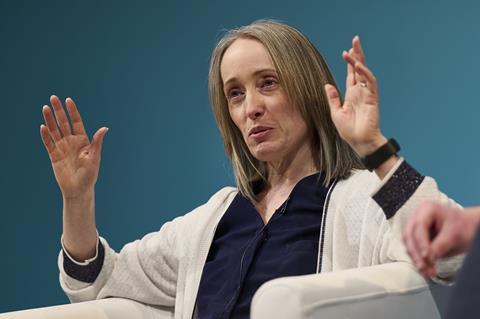Seventeen of the country’s biggest pension providers have pledged to allocate at least 10% of their default defined contribution (DC) investment funds to private markets, with half in UK assets, through the Mansion House Accord.
Many already meet this target, having supported the 2023 Mansion House Compact, but others are approaching unlisted assets for the first time.
Ahead of the official signing ceremony for the Mansion House Accord today (13 May), the signatories explained their intentions and urged the government to support the creation of investable opportunities for pension schemes.
“Realistic timeframes and a steady supply of high-quality UK investment opportunities across all private asset classes are crucial for ensuring success.”
Lorna Blyth, Aegon UK
Now Pensions plans to make its first commitment to private markets soon, investing in affordable housing. The master trust’s chief executive Patrick Luthi and its trustee board chair Joanne Segars said the Mansion House Accord marked an “important joint commitment by government and providers”.
“By investing in appropriate UK private market opportunities, we can together achieve alignment of our member’s long-term interests, with UK growth and benefits to society more broadly,” they added.
Benoit Hudon, CEO and chairman of Mercer UK, which owns Now Pensions, added: “Having the flexibility and ambition to invest into initiatives that bolster UK economic growth has the potential to benefit communities, help put more money in people’s pockets and support public services and indeed the broader economy.”
Jamie Fiveash, CEO of Smart Pension, said his firm planned to “go beyond the minimum commitments”, with more investments in UK assets to be announced in the next few weeks.

Pragmatic approach to implementation needed
Aegon and NatWest Cushon are currently working with the British Business Bank to develop the British Growth Partnership to invest in UK venture capital and other small, high-growth businesses. Aegon has also launched several long-term asset funds to increase its ability to invest in various unlisted asset classes.

Lorna Blyth, managing director of Aegon UK’s investment proposition, urged the government to take a “pragmatic approach to implementation” given the volume of new legislation expected in the coming months.
“Realistic timeframes and a steady supply of high-quality UK investment opportunities across all private asset classes are crucial for ensuring success,” Blyth said.
“This includes collaborating with more organisations such as the British Business Bank to provide access to diverse types of private assets – from private equity to infrastructure, which are all vital for optimising member benefits and developing investment portfolios designed for long-term growth.”
The People’s Pension has been preparing for a major push into private markets, setting up an internal investment function and hiring new staff to support its aim to allocate at least £4bn to private markets.

Dan Mikulskis, chief investment officer of People’s Partnership, provider of the People’s Pension, said: “As well as signing the Mansion House Accord, we have taken real, concrete steps to build the internal capability, and leverage our scale, to invest in private market assets in a way that leaves value in the hands of members and not asset managers.
“We look forward to continuing our philosophy of building deep partnerships with the right asset managers, alongside specialist internal capability to deliver the best outcomes for members. Current global risks highlight some of the benefits of UK assets, which are also often cheaper to access than overseas alternatives leaving more value in the hands of members.”
‘Getting comfortable’ with domestic allocations
Steve Charlton, DC managing director at SEI, said the government’s commitment to support investable opportunities for pension funds had mitigated his firm’s previous concerns that pushing schemes to allocate to the UK could result in higher prices and lower quality assets.
“Due to ongoing collaboration and open dialogue between the industry and the UK government, we have become comfortable with the proposed changes to the Mansion House reforms,” Charlton said.
“This accord demonstrates our collective ambition to have a consolidated workplace pension environment that provides flexibility and choice for pension funds to invest where they see opportunity, while balancing their responsibility to members… It enables everyone to play their part in helping to deliver better member outcomes and drive economic growth.”
“It is reassuring to see that the government has been so clear that it continues to support the principle that decisions about how pension scheme members’ money is invested should be made independently of government and with the best interests of members in mind.”
Helen Dean, Standard Life Master Trust
Helen Dean, chair of the Standard Life Master Trust – part of Phoenix Group – added: “It is reassuring to see that in today’s announcement the government has been so clear that it continues to support the principle that decisions about how pension scheme members’ money is invested should be made independently of government and with the best interests of members in mind. This fiduciary principle is extremely important and underpins trust and confidence in our pension system.”

Meanwhile, the Universities Superannuation Scheme (USS) already invests 25% of the growth section of its DC offering in private markets, and 12% of the growth section in UK private markets.
Carol Young, USS’s group chief executive officer, said: “We believe that private markets can offer attractive investment opportunities for pension schemes like USS… We welcome the opportunity to sign the Mansion House Accord, which reflects our existing approach and the steps we would like to see from government to better support private and UK investment.”
‘Substantial positive impacts’ possible through UK investment
Nest has already invested more than £8.5bn in the UK, and intends to grow this to around £20bn by 2030. Liz Fernando, the master trust’s chief investment officer, said: “As a scheme committed to investing at scale in private markets, as well as in the UK, we are pleased to join colleagues from across the industry in this significant initiative.
“We currently have around 15% of our assets under management in private markets, and an ambition to increase this to 30% in the coming years. Around 60% of this private market allocation already is in the UK. Our members are UK workers, and we want to invest in their communities and the infrastructure they use, to help drive the UK economy.
“We are confident our approach will help drive substantial positive impact for our members and the UK, and we continue to foster partnerships that help us tap into the great investment opportunities on our doorstep.”

Andy Briggs, Phoenix Group’s chief executive officer, said the Mansion House Accord could help strengthen the economy by “fuelling the growth of British businesses and boosting investment in critical infrastructure”.
Phoenix Group was a founding signatory to the 2023 Mansion House Compact and has set up Future Growth Capital in partnership with Schroders to invest in line with this agreement.
Briggs said the Mansion House Accord was “the natural next step, and we’re proud to play our part in delivering better outcomes for our customers and for the wider society”.
“The new Mansion House Accord is… a fantastic example of how the UK pensions industry can work together to break down barriers to enable greater investment in private assets.”
Jo Sharples, Aon
Amanda Blanc, Aviva’s group chief executive officer, said: “This is a major opportunity for the pension and investment industry to support UK growth while delivering improved outcomes for pension savers. As a significant investor in private markets, Aviva has recently launched a number of funds to give over four million workplace pension customers even greater opportunity to invest in UK assets, including innovative, early-stage businesses, and we want to do much more.”
M&G’s chief executive Andrea Rossi said: “Private markets play a fundamental role in shaping the world around us through long-term investment in real estate and infrastructure projects, alongside lending to and investing in companies that contribute to economic growth.
“By enabling and encouraging greater investment into these assets, individuals could benefit from enhanced returns, greater diversification and better value by having their pensions invested in this way.”
M&G’s main default DC offering is its With Profits Fund, which has £128bn in assets under management.
Jo Sharples, chief investment officer for DC solutions at Aon, said: “We believe that investing in private assets will benefit pension scheme members by delivering better expected returns over the long-term, ultimately resulting in higher retirement outcomes.
“The new Mansion House Accord is a great step forward in achieving this and is a fantastic example of how the UK pensions industry can work together to break down barriers to enable greater investment in private assets.”
Read the full text of the Mansion House Accord here.
Scottish Widows opts not to sign Mansion House Accord
Although it was a signatory to the 2023 Mansion House Compact, Scottish Widows has opted not to sign this week’s agreement.
A spokesperson for the company said: “It is great to see the government and industry focusing on further private investment into the UK.
“We’ve announced plans to launch a long-term asset fund, as part of our ongoing commitment to providing innovative investment solutions so that our customers have the option to invest further in private markets.
“We remain committed to the Mansion House Compact target of investing 5% of our default funds in unlisted equities by 2030. Later this year we’ll share details on further investment into innovative UK business.”
Approximately 7.6% of the £72bn invested in Scottish Widows’ default pension arrangements is allocated to the UK.

























